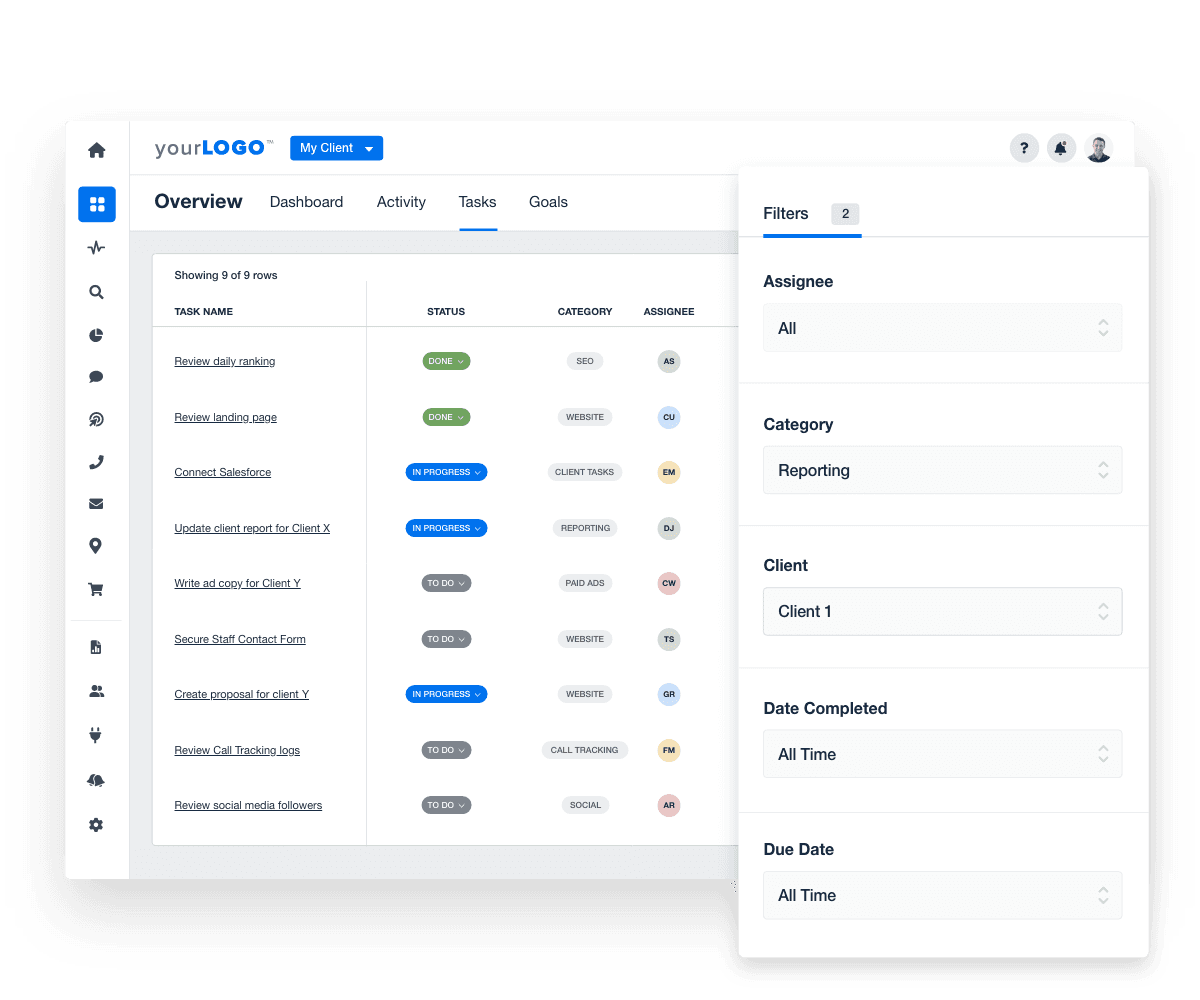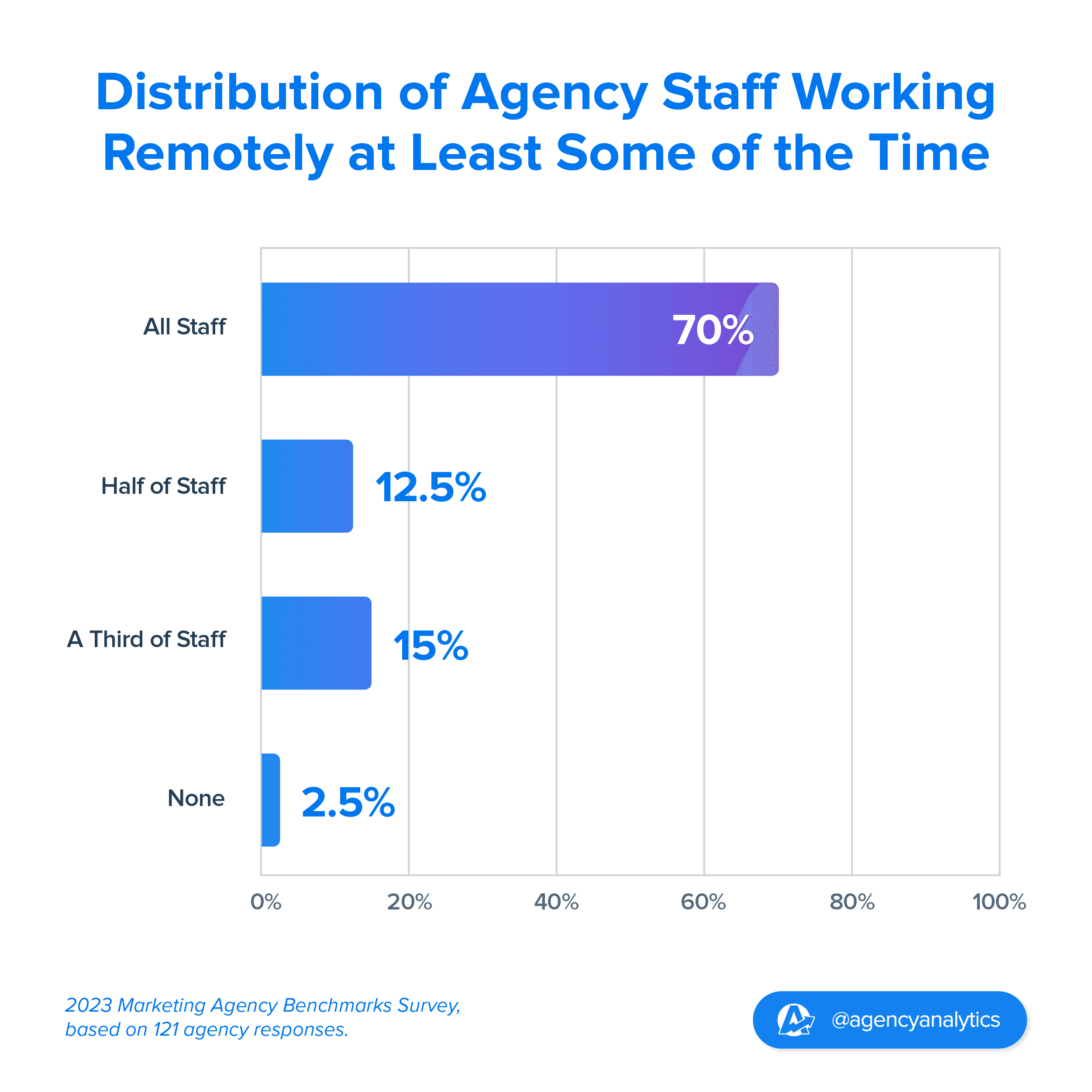Table of Contents
Table of Contents
- What Is Delegating at a Digital Marketing Agency?
- Why Is Delegating Hard for Agency Owners?
- Why Do Marketing Agency Leaders Need to Delegate Work?
- When Is the Right Time to Delegate Work?
- 6 Steps to Delegate Work Effectively
- Effective Delegation for Remote or Hybrid Marketing Agencies
- Pitfalls To Avoid for Successful Delegation
- True Story of a Delegating Pro
- Your Agency Leaders Can’t Afford To Ignore Delegation
7,000+ agencies have ditched manual reports. You can too.
Free 14-Day TrialQUICK SUMMARY:
Delegation at a marketing agency requires a leader to assign tasks to team members, allowing them to focus on strategic growth. Effective delegation frees up time for high-level decision-making and empowers staff to develop their skills. This guide provides strategies for implementing and finding ways to delegate at a marketing agency to drive scalability and success.
“You can’t pour from an empty cup.”
This little nugget of wisdom is as true as it is flagrantly ignored by marketing agency owners and leaders around the globe. Let’s face it: it takes a ton of tenacity, work ethic, energy, and hustle to own or run a digital marketing agency. The people who do it seem to find endless reserves from which to keep pouring.
Unfortunately, that mentality is not only unhealthy for agency owners personally, it risks stifling the growth of the agency itself by tying down leadership when their attention, time, and focus are required elsewhere.
Want to solve the problem once and for all, freeing up your time to scale your agency and nurturing your staff to their full potential? What you need is an end-to-end course on delegating.
We’ve got you covered with everything you need to know about leadership delegation at a marketing agency:
Let’s get into it.
What Is Delegating at a Digital Marketing Agency?
Delegating is the act of assigning tasks to another person instead of doing them yourself. In the context of a growing marketing agency, it’s often the owner or leader handing off the day-to-day operational or administrative tasks in order to focus on more strategic, big picture work. For you as an agency leader, it means less working in the business and more working on the business.
While you’ll ultimately spend less time doing “billable” work, you’ll spend more time focused on steering the agency as a whole towards your vision and making the critical decisions that only you can make.
Why Is Delegating Hard for Agency Owners?
A lot of agency leaders struggle with delegating for a wide range of reasons, such as:
Difficulties fully trusting the agency employees or team to deliver the desired vision or output.
Feelings of stress or urgency, as though there isn’t enough time to hand off the work, or that delegating in and of itself is another burden.
Concerns about numerous rounds of review, feedback, or re-work that will be more time-consuming than just doing the task in the first place.
Hesitancy to relinquish projects or clients that one is personally invested in, or especially passionate about.
Feelings of guilt for adding more work to the plates of busy colleagues and employees.
An avoidance tactic to stay in the space where one is comfortable, rather than having to face daunting or intimidating strategic work.
Whatever the reason that you may hesitate to delegate tasks, we encourage you to find a way to work through those feelings, because as you’ll see in the next section, delegating is a crucial skill for marketing agency owners and leaders to ensure sustainability and scalability.
Until you've delegated tasks, you don't know how important that is, and you don't know how to do it well. You worry: what if they don't do it right? And what if they don't do it as good as me? It's scary and it's hard to do, and it's hard to let go, and then you do it, and then everything gets better.
Jens Rhoades, President, Floodlight SEO
Why Do Marketing Agency Leaders Need to Delegate Work?
Delegating is the right thing to do for the agency owner, for the agency employees, and for the agency itself. Delegation is not only linked to stress reduction, but also to job satisfaction, motivation, and crucially, organizational effectiveness.
I look for every opportunity to delegate and elevate from sales to finance, from operations to account management. Every time I've delegated a role within my organization, the person being elevated not only picks up where I left off, but typically within three months is outperforming me.
Dan Delmain, Owner, :Delmain
Delegating Work Benefits You as an Agency Owner
You may think you have infinite bandwidth, but you don’t. Productivity and effectiveness tank in all human beings when they don’t get enough breaks–and you’re no exception.

If you can’t delegate for yourself personally, do it for yourself professionally. When you delegate operational tasks, you have more time to explore your passions and interests that benefit your career and your agency in unexpected or unconventional ways.
For instance, you may find you have more time for networking, or to position yourself as an industry thought leader. Could you end up as a guest lecturer at your local college? Maybe taking the stage at a TED conference or being invited to sit on a panel at the next SalesForce conference? Who knows where you’ll go–and what new leads, resources, and allies you can acquire for your agency in the process.
Agency Tip: Don’t get hung up on perfection. We’re not saying that delegating will magically make your to-do list disappear; you are in the ever-evolving, fast-paced industry of digital marketing, after all. But it’ll help.
Delegating Work Benefits Your Agency Employees
Think of delegating as just another form of professional development. When you do delegate tasks, you are inherently allowing your staff opportunities to learn and grow. Each task that you allow them to manage is as much a feather in their cap as it is a weight off your shoulders. You’ll find that delegating may even improve retention and employee satisfaction; it’s win-win!
For instance, perhaps your agency struggles with a lengthy client reporting process. It’s been on your to-do list to evaluate various solutions and pick one that meets your agency’s needs and budget.
Perhaps you can choose one of your client-facing account managers to lead the charge on researching options and building a business case for the solution that will best suit your team. This is her time to show a strategic mindset that can devise a solution at the intersection of process refinement, user acceptance, and budgetary restrictions.
Delegating Work Benefits Your Agency as a Whole
Freeing up your time to do mission-critical strategic work means that your agency reaps the benefits of having done that work.
Whether it’s writing a business plan to secure investments, assessing new markets or revenue streams, using new skills, or restructuring the way your agency offers its services, the secret to scalability is having the time to devote to this type of work. This is the stuff that nobody else at your agency has the knowledge, or the authority, to do. Because unlike what you delegated, this work literally can’t be done by somebody else.
Impress clients and save hours with custom, automated reporting.
Join 7,000+ agencies that create reports in under 30 minutes per client using AgencyAnalytics. Get started for free. No credit card required.
Already have an account?
Log inWhen Is the Right Time to Delegate Work?
The best time is now. In a digital agency environment, there’s no wrong time for leaders to delegate–because delegating is essentially another way of making sure the right people are focusing on the right things. If you’re here reading this, it’s likely that consistent, intentional delegating is long overdue at your agency.
If it's all running through one person, it's really not going to be efficient. There's not a whole lot that one person can do. But when you've got, you know, 9 people working towards the same goal, that's where things can really happen.
Christina Cypher, Director of Marketing, Click Control Marketing
But if you’re looking for a more specific answer than “now”, the best time to delegate work is when you see your schedule and list of accountabilities filling up with items that do not directly impact optimizing how your agency operates.
6 Steps to Delegate Work Effectively
If you’re ready to start the delegating process at your agency but want to lead consciously to achieve the best outcomes, simply follow these common sense, six steps:
1. Start by Defining the Task(s) You Want to Delegate
We hear often from busy agency owners and leaders that they are being crushed by an ever-growing mountain of work. But unfortunately, you can’t delegate effectively by pointing at that mountain and telling others, “Go climb it!” It doesn’t work like that.
You’ll have to start with concrete tasks, projects, or to-do list items that are not part of your core job description as the strategic leader of this growing digital agency. It’s not that these tasks are beneath you; it’s that your valuable, in-demand time is better spent elsewhere.
Start with tasks or items that you can easily define. Such as:
Redesigning the agency website
Creating quarterly performance reports
Running the weekly status meeting
Signing off on SEO plans for new clients
Interviewing early-round candidates
Reviewing code prior to launch
2. Understand Your Team’s Strengths and Weaknesses
Not everyone on your team is cut out to take on your tasks. Your bookkeeper probably isn’t the right person to create the next viral TikTok video; your account managers might not be the best equipped to revise your company's change management plans.
So, when considering the tasks that you need to delegate, start with an honest assessment of the skills, passions, strengths, and weaknesses of the potential players.
In some cases, where the importance is high and your tolerance for risk is low, you’ll want to delegate the task to the person who is most experienced or best qualified to succeed.
In other cases, perhaps where time is on your side or the risk is minimal, consider delegating to an employee for whom this would be a great learning opportunity. You’ll not only get the task off your plate, you’ll also empower and develop a member of your staff.
3. Communicate Clear Expectations
Yes, delegating is work. It takes effort to hand off tasks with grace and clarity. But just as you have learned to manage client expectations, the more you do it, the easier it will become.
Take time prior to meeting with your employee or other team member to define what the “ask” is, what success looks like, and what the scope of this responsibility is. Though it may be a headache, you’ll save time, effort, and re-work down the road if expectations are clear from the outset.
Before handing off the task, clarify any of the following that might be applicable:
What is the ultimate goal or desired outcome you would like to see?
Are you handing off the whole task or just part?
What would be considered within scope for the employee? What would be outside of scope?
How much authority or autonomy do they have?
What are some potential red flags you would want them to raise?
What are key milestones and deadlines in the project?
Where should this fall on the employee’s list of priorities?
Should the employee follow a template or guideline? Should they conduct external research?
Is there a budget the employee needs to stick to?
Who should review or provide feedback? Who can assist or provide support?
Do you have examples of what to aim for? Or examples of what not to do?
Do they need to consult with other people, teams, or departments?
How much (or how little) do you want to be kept in the loop?
Who has the final sign off?
Effective leadership relies heavily on clear communication. By examining email threads, meeting notes, and other communication records, we assess if directives are clear, if there's open dialogue between levels, and if any crucial information is being lost or misconstrued.
Adam Stewart, Founder, Digital Bond
4. Set Check-Ins and Deadlines
Delegating doesn’t mean that you lose all visibility into a project; it simply means that the accountability of who does the work has changed. Once you’ve sat down to discuss delegating a task to one of your colleagues or employees, finish the conversation by opening your calendars. Put in the key deadlines and milestones, and then consider if you should schedule other forms of checking in with yourself or with another supervisor.
There are a variety of ways to keep a pulse on things, depending on the type of task you’ve delegated. You may ask your employee to send a weekly summary or automated report to yourself or to their manager. Or perhaps you’ll simply add this as a topic for existing one-on-one meetings.
For urgent, highly important matters, you may want to book quick catch-ups a few times a week, until you feel confident that they have it well-handled. But, if you can delegate supervision of this to a different member of your leadership team, even better!
Agency Tip: If you’re going to meet regularly to be updated on this particular task, you may want to jot down a list of questions that you’ll want the employee to answer each and every time. Keeping these updates formulaic, templated, and repeatable will ensure the check-ins are brief and effective.

Create, manage, and track tasks with the enhanced task management tool.
5. Provide Adequate Resources and Support Systems
The most important thing you can do to succeed in delegating is to set employees up for success. This means providing the right task management tools and workflows, resources, and support systems to help them do the work well. If you have documentation, specs, style guides, templates, or blueprints for them to follow, so much the better.
Agency Tip: If these materials don’t already exist, consider creating them–or delegating the task of creating them. Likewise, if your agency doesn’t have the tools or software it needs to streamline this task, consider delegating the task of researching options to someone on your team. Yes, it’s more upfront effort, but it will pay dividends when you have processes that enforce consistency and efficiency.
6. Celebrate Achievements and Extract Lessons From Mistakes
As an analytics company, AgencyAnalytics is pretty committed to, you know, measuring results. And your delegation endeavors should follow a similar suit. No, you might not be able to auto generate a report in real-time of how effectively your employee is handling delegated tasks, but that shouldn’t deter you from evaluating outcomes, and having some sort of post-mortem re-group with relevant parties.
Whether this foray into delegating was a wild success or there’s room for improvement, it’s worth your time to take a look at what went right and wrong, so that you know what to try differently the next time around.
We have found that reinforcing positive leadership behaviors and fostering a culture of continuous improvement is a proactive and effective way to prevent issues. By emphasizing and celebrating what works well, we naturally create an environment where potential mistakes are less likely to occur.
Jackson Sands, Marketing Manager, Sands Media
Effective Delegation for Remote or Hybrid Marketing Agencies
Now that many digital agencies are working in a remote or hybrid environment, delegating looks a little different than it did even just a few years before.

The AgencyAnalytics 2023 Benchmarks Report found that a whopping 97.5% of agency staff are working remotely at least some of the time. As it stands, many of the same best practices that you employ to manage your remote or hybrid agency also apply to delegating to remote staff.
The most important element for delegating to remote staff is to maintain communication. Since you can’t just walk over to their desk and chat on your way back from the coffee machine, you’ll need to establish other, more structured check-ins that don’t get lost in the fray.
Virtual touchpoints, a dedicated group chat or channel, collaborative project management tools, and real-time dashboards are all options to keep you in touch, informed, and organized–even if the person you delegated to is in another state.

Pitfalls To Avoid for Successful Delegation
If you follow the six steps above, you’ll be well on your way to delegating tasks effectively and shifting your to-do list to be focused on higher level work. As you continue to hone your delegating skills, here are a few key things to avoid:
Don’t: Move the Goalposts or Change the Definition of Success on the Fly
Do: Clearly communicate if the initial scope of the task was incorrect or flawed in some way.
If a course correction is required, it’s important to communicate this clearly with the employee or even reconsider to whom you’ve delegated. Your staff aren’t mind-readers; if you’ve realized something has happened and you’ve changed your mind from what was originally communicated to your employee, you need to make these changes clear to them.
One of my biggest fears is being the bottleneck within the organization. But the more I delegate and elevate, the further away I get from the fear. The growth to the agency is limitless, employees feel empowered, and clients gain from someone else who excels in that role.
Dan Delmain, Owner, :Delmain
Don’t: Be Vague or Make Assumptions
Do: Understand that the success or failure of delegating is all in clear communication.
If you catch yourself saying “you know”, or glossing over details because it’s too much work or too time-consuming to go through it all, stop. Delegating only works if you do it right. Avoid delegating if you can't be precise with your request. To ensure your staff member has understood, ask them to repeat back to you what they heard. Put in the effort to confirm that you are both on the same page.
Don’t: Trust a Verbal Conversation Alone
Do: Keep a written record.
Either have someone take notes of your meeting or have the employee’s first task be to send you a summary of your conversation, the decisions reached, and commitments made. This mitigates the risk of confusion or finger pointing down the road.
One of the biggest challenges we faced was ensuring that every employee was aligned with our mission and values, while also having the resources they needed to perform their jobs effectively. To address this, we created checklists and written procedures for every position and every repeatable task.
Adam Binder, Founder and CEO, Creative Click Media
Don’t: Give Up if Your First Attempts Flop
Do: Persist and learn from every iteration.
Delegating is a management skill that is learned and practiced, just like any other skill or habit. And as a marketing agency, we’re sure you know a thing or two about iterative improvements! So keep at it; it’s well worth your while to master this skill.
True Story of a Delegating Pro
Now that you’ve considered the theory of effective delegation, let’s see it in action. Here’s the story of Jessica Tappana, the owner of Simplified SEO, located in Missouri, US.
After two years of careful planning and designing repeatable processes to set her team up for success, Tappana has practiced and perfected delegating so much that she is ready to take a sabbatical traveling the world with her family.
While she’ll be checking in regularly with her team, she has built models of her clients’ most common needs during their customer lifecycle. These models empower her other team members to work independently and continue to provide that high quality output for which her agency is known.
I told my team that this was my dream, and everyone was so supportive. We started making a list right then and there of everything that needed to happen, and I asked them, ‘What else am I missing?’ and they said, ‘We’ve got this. Trust us.’ I told them I will not be nearly as available, but they feel comfortable with it, and so do I.
Jessica Tappana, Founder, Simplified SEO
To learn more, check out the full story of how Jessica achieved this dream–and more details on the once-in-a-lifetime adventure she’s embarking on.
Your Agency Leaders Can’t Afford To Ignore Delegation
Scalability doesn’t just happen. It comes from the right minds pouring their time and energy into working through challenges and figuring out the best strategies to achieve your goals. Everything that you give to operational tasks is a choice not to give to optimizing tasks.
Whether delegating feels scary, foreign, time-consuming, or too complicated, we urge you to make it a normalized and celebrated part of your agency culture. Your agency needs you to delegate so that you can prioritize the critical strategic work that others simply cannot do.
Delegating has tons of benefits for your agency aside from freeing up your capacity. It also helps you to train team members, develop their skills, and retain them–all of which aids in that end goal of putting your digital agency on a growth trajectory. Make sure you have a full cup from which to pour; make your delegating journey easier for everyone with simplified task management tools built specifically for marketing agencies.
Join more than 7,000 marketing agency customers and start your free 14-day trial with AgencyAnalytics today!
Impress clients and save hours with custom, automated reporting.
Join 7,000+ agencies that create reports in minutes instead of hours using AgencyAnalytics. Get started for free. No credit card required.

Written by
Elyse Gagné develops branding and content strategies that unite businesses with their customers. A podcast junkie, you'll find her learning about the latest technologies and brand storytelling techniques while she gardens or hikes.
Read more posts by Elyse GagnéSee how 7,000+ marketing agencies help clients win
Free 14-day trial. No credit card required.






